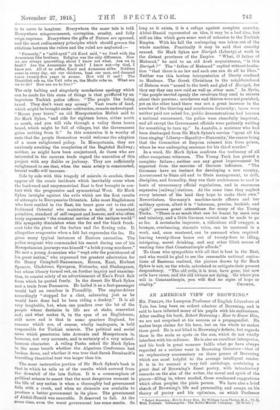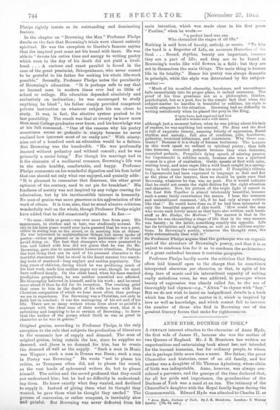AN AMERICAN VIEW OF BROWNING.* ME. PHELPS, the Lamps= Professor
of English Literature at Yale, has long been an ardent admirer of Browning, and is said to have infected many of his pupils with his enthusiasm. After reading his book, Robert Browning r How to Know Mira, we are not surprised at his success as a propagandist. Ho makes large claims for his hero, but on the whole he makes them good. He is not blind to Browning's defects, but regards them in the main as spots on the sun, which do not vitally interfere with his radiance. He is also an excellent interpreter, and his book in great measure fulfils what we have always regarded as a serious want in Browning literature—that of an explanatory commentary on those poems of Browning which are most helpful to the average intelligent reader. It is in its essence a very full anthology, containing a great deal of Browning's finest poetry, with introductory remarks on the aim of the writer, the moral and spirit of the pieces—filling in, where needed, those condensed suggestions which often perplex the plain person. We have also a brief sketch of Browning's life and personality, and essays on his theory of poetry and his optimism, on which Professor
* Robert Browning: How to Know Kim. By William Lyon Phelps, TICA., P111, With Portrait. Indianapolis : The Bons-Merrill Company. {(01•50 net,'I
Phelps rightly insists as its outstanding and dominating feature.
In the chapter on "Browning the Man" Professor Phelps dwells on the fact that Browning's trials were almost entirely spiritual. He was the exception to Goethe's. famous saying that the inspired poet must eat his bread with tears.. He was able to " devote his entire time and energy to writing poetry which even to the day of his death did not yield a liVeli- hood. . . A curious and exact parallel is found in the case of the great pessimist, Schopenhauer, who never ceased to be grateful to his father for making his whole life-work possible." Secondly, Professor Phelps notes the peculiarity of Browning's education. " It is perhaps safe to say that no learned man in modern times ever had so little of School or college. His education depended absolutely and exclusively on inclination ; he was encouraged to study anything he liked " ; his father simply provided competent private instruction on whatever subject his son chose to study. It was, in fact, the elective system pushed to its last possibility. The result was that at twenty he knew more than most College graduates ever know, and his knowledge was at his full command. " One of the reasons why his poetry sometimes seems so pedantic is simply because be never realized how ignorant most of us really are." With ninety- nine out of a hundred such an education would be a failure. But Browning was the hundredth. "He was profoundly learned without pedantry and without conceit ; and he was primarily a social being." For though his marriage had in it the elements of a mediaeval romance, Browning's life was in the main healthy, comfortable, and happy. Professor Phelps comments on his wonderful digestion and his firm belief that one should eat only what one enjoyed, and quaintly adds : "It is pleasant to remember that Emerson, the other great optimist of the century, used to eat pie for breakfast." His fondness of society was not inspired by any vulgar craving for admiration, but by his inexhaustible interest in humanity. No man of genius was more generous in his itphreciation of the work of others. It is true, also, that he stood abusive criticism 'wonderfully well on the whole, though Professor Phelps might have added that he did occasionally retaliate. In fine :— " No man—little or great—was ever more free from pose. His appearance, in clothes and in hair, was studiously normal. No one in his later years would ever have guessed that he was a poet, either in seeing him on the street, or in meeting him at dinner. He was interested in multitudinous things, but never spoke of poetry—either in general or in his own particular—if he could avoid doing so. The fact that strangers who were presented to him and talked with him did not guess that he was the Mr. Browning, gave rise to numberless humorous situations. Perhaps the best thing that can be said of his personal character is the truthful statement that he stood in the finest manner two search- ing tests of manhood—long neglect and sudden popularity. The long years of oblivion, during which he was producing much of his best work, made him neither angry nor sour, though he must have suffered deeply. Ofi the otlier hand, when his fame reached prodigious proportions, he was neither conceited nor affected. Tae thoroughly believed in himself, and in his work ; and he cared more about it than he did for its reception. The crushing grief that came to him in the death of his wife he bore with that Christian resignation of which we hear more often than perhaps we see in experience. For Browning was a Christian, not only in faith but in conduct ; it was the mainspring of his art and of his life. There are so many writers whose lives show so painful a contrast with the ideal tone of their written work, that it is refreshing and inspiring to be so certain of Browning ; to know that the author of the poems which thrill us was as great in character as he was in genius."
Original genius, according to Professor Phelps, is the only exception to the rule that subjects the production of literature to the economic law of supply and demand. The man of original genius, being outside the law, since be supplies no demand, and there is no demand for him, has to create the demand air well as the supply. " Such a man in Music was Wagner; such a man iu Drama was Ibsen; such a man in Poetry was Browning." He wrote "nob to please his critics, as Tennyson often did, not to please the crowd, as the vast horde of ephemeral writers do, but to please himself. The critics and the crowd professed that they could pot understand him; but he bad no difficulty in understand- ing them. He knew exactly what they wanted, and declined to supply it. Instead of giving them what he thought they wanted, he gave them what he thought they needed." The process of conversion, or rather conquest, is inevitably slow tsJad painful. But Browning was never (Ideated from hie
main intention, which was made clear in his first poem " Pauline," when he wrote :— " a perfect bard was one Who chronicled the stages of all life."
Nothing is said here of beauty, melody, or music. "To him the bard is a Reporter of Life, an accurate Historian of the Soul. . . . Sound, rhythm, beauty are important, because they are a part of life ; and they are to be found in Browning's works like wild flowers in a field : but they are not in themselves the main things. The main thing is human life in its totality." Hence his poetry was always dramatic in principle, while the style was determined by the subject- matter :-
"Much of his so-called obscurity, harshness, and uncouthness falls immediately into its proper place, is indeed necessary. The proof of his true greatness not as a philosopher, thinker, psychologist, but as a poet, lies in the simple fact that when the subject-matter be losndles is beautiful or sublime, his style is usually adequate to the situation. Browning had no difficulty in writing melodiously when he placed the posy in the Ring,
0 lyric Love, half angel and half bird And all a wonder and a wild desire, although just a moment before, when he was joking about his lack of readers, he was anything but musical. The Ring and the Book is full of exquisite beauty, amazing felicity of expression, fluent rhythm and melody ; full also of crudities, jolts, harshness, pedantry, wretched witticisms, and coarseness. Why those con- trasts? Because it is a study of human testimony. The lawyers in this work speak no radiant or spiritual poetry ; they talk like tiresome, conceited pedants because they were tiresome, conceited pedants ; Pompilia's dying speech of adoring passion for Caponsacelai is sublime music, because she was a spiritual woman in a glow of exaltation. Guido speaks at first with calm, smiling irony, and later rages like a wild boast caught in a spring- trap ; in both cases the verse fits his mood. If Pompilia's tribute to Caponsacchi had been expressed in language as dull and fiat as the pleas of the lawyers, then we should be quite sure that Browning, whatever he was, was no poet. For it would indicate • that he could not create the right diction for the right situation and character. Now, his picture of the triple light of sunset in The Last Ride Together is almost' intolerably beautiful, because such a scene fairly overwhelms the senses. I hear the common and unintelligent comment, ‘Ah, if he had only always written like that l' Ile would have done so, if he had boon interested in only the beautiful aspects of this world. 'How could the man who wrote such lovely music as that have also written such harsh stuff as Mr. Mudge, the Medium!' The answer is that in the former he was chronicling a stage of life that in its very essence was beauty : in the latter, something exactly the opposite. Life has its trivialities and its ugliness, as well as its sublime aspira- tions. In Browning's poetry, whenever the thought rises, the style automatically rises with it."
So Professor Phelps argues that the grotesque was an organic part of the structure of Browning's poetry, and that it is as unjust to condemn him for it as to condemn the architecture of a great cathedral because it contains gargoyles.
Professor Phelps hardly meets the criticism that Browning
often laid himself open to the charge that he sometimes interpreted obseurunt per °Neuritis, or that, in spite of his deep love of music and his intermittent capacity of writing really melodious verse, he was addicted, in passages where beauty of expression was clearly called for, to the use of thoroughly bad rhymes—e.g., "Africa" to rhyme with "bay." But we do not wish to insist on insignificant details in a book which has the root of the matter in it, which is inspired by love as well as knowledge, and which cannot fail to increase the number of those who find in Browning one of the greatest literary forces that make for rightcouenecs.







































 Previous page
Previous page